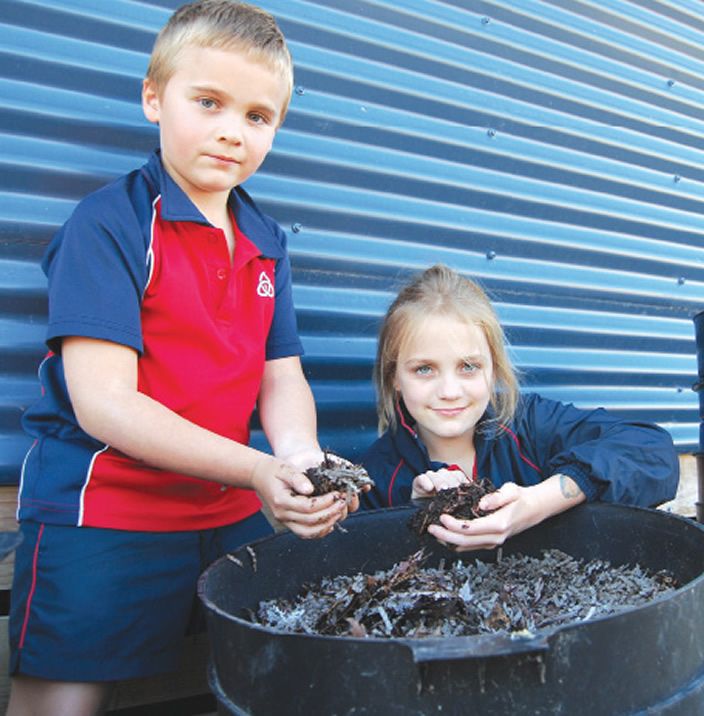
A 240 litre bin full of food scraps no longer heads to landfill every week thanks to the hard work of Trinity Anglican College staff and students, aided by a $3000 IEU Environment Grant, sponsored by Teachers Mutual Bank.
The Thurgoona school applied for the Environment Grant in 2016 after participating in a HalveWaste organic bin trial, which highlighted the amount of food scraps being thrown out every week.
Junior Science teacher Jarryd Thurling said this huge amount of waste “set alarm bells ringing”.
The school was thrilled to be successful in winning the grant which enabled them to buy 17 worm farms.
“Year 3 students collect food scraps from each junior school classrooms, the canteen and the office facilities. Students then either blend the scraps, or cut them up and put them into the worm farms,” Jarryd said.
“Each fortnight on a Friday afternoon we set up a small market stall. Students have been selling ‘worm juice’ or worm wee to the parents.
“The students have designed labels and market the products. With the money made we have purchased three 400 litre compost heaps which we use to store the food that the worms cannot eat.
“We are able to add scrap paper, paper towels and newspapers into the compost heaps. On occasion, we replace the worm bedding and sell the worm castings.
“Since we have established the worm farms we have continued to take the school in a green direction.
“This year we have added 21 wicking garden beds made from recycled intermediate bulk containers. At a later stage we will add composting worms from the farms to the IBC tanks with the use of a ‘worm tower’ to be installed into the beds.”
Jarryd said the wicking beds were chosen as they are water friendly and plants can last a week or more in summer without being watered, allowing them to survive the holiday periods.
“In spring, we will be growing summer fruits and vegetables and selling them as part of our fortnightly stall. Students once again will need to market and advertise these products to the parent body.
“We have also started to make a cleaning product out of the peels from the orange juice. We place these peels in vinegar for about six to eight weeks. As per other items this will be marketed and sold within the school.
“Money generated is being used to add additional supplies within the garden area, hopefully over time we will generate a collection of heirloom seeds which we plant and then capture seeds from at the end of each season to use for the next year.
“The transformation that has occurred within a 12 month window is incredible. The HalveWaste trial revealed just how much organic matter we were throwing out, the grant provided us with a solution to that problem and the inspiration to take things further.
“Some students have been pressuring their parents to purchase them a worm farm to use as home, which can only be a good thing!
“The students have gained an invaluable insight into how much waste we produce, how to work towards reducing their footprint, the impact of their decisions and their ability to make a difference in the world,” Jarryd said.
Applications are now open for this year’s IEU Environment Grants.
Members in schools, colleges or early childhood centres are invited to apply for one of five Environment Grants of up to $3000 each, sponsored by Teachers Mutual Bank.
Typical projects could include habitat conservation, biodiversity, vegetable and kitchen gardens, water and energy saving, tree planting, recycling, waste, composting and Aboriginal cultural projects.
Applications close 19 July. For applications forms and further information contact Betty Tan at betty@ieu.asn.au


































































































































